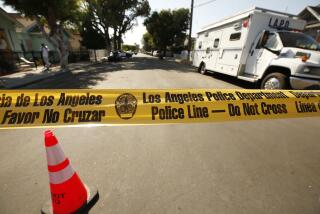Bomb Hoax Disrupts Moscow Airport : Crime: Spate of both real and threatened explosions points up Russian security weaknesses.
- Share via
VNUKOVO, Russia — In the most disruptive incident to date in an epidemic of threatened terrorist acts, police evacuated one of Moscow’s three international airports Monday after a caller claimed that a bomb was about to explode at the crowded transport hub.
The hoax that disrupted more than 30 flights and delayed thousands of passengers at Vnukovo International Airport was the latest in a rash of false alarms and genuine bombings undermining already flimsy security and fraying the nerves of Moscow’s 10 million residents.
Since Chechen guerrillas made good last month on a threat to avenge their war losses by spreading terrorism throughout Russia, dozens of bombings and threatened explosions have paralyzed essential activities--at airports, hotels and federal headquarters.
“We fear the perpetrators are testing us and waiting for the time we don’t react--and then they’ll really blow something up,” said Lt. Alexei Krivorotov, the frustrated duty officer at the police precinct in Vnukovo.
Monday’s 90-minute shutdown and search of the airport packed with summer vacation travelers was the fourth to afflict Vnukovo alone in the past month, said Alexander M. Kolesnikov, a senior airport administrator.
“It just makes you mad as hell to realize that some insane or evil-minded individual can disrupt the work and lives of so many people so easily and there’s nothing that can be done about it,” he fumed.
But with their outmoded, overtaxed telecommunications system, Russian police and security officials are easy prey for pranksters and terrorists. Incoming calls cannot be immediately or accurately traced, forcing the police to order precautionary evacuations after virtually every threat.
“Look for yourself. We don’t have the equipment. We don’t have anything!” Krivorotov complained, gesturing toward the circa-1950 telephone system in use at the Vnukovo precinct.
Throughout Moscow and increasingly in the provinces as well, vital government and public facilities are ground to a halt daily by phoned-in threats that cannot be dismissed without time-consuming searches and investigations.
Authorities express further frustration because they have virtually no chance of apprehending those responsible for the costly hoaxes; even if the culprits are caught red-handed, they can be charged only with the misdemeanor of “hooliganism.”
Although most bomb threats around the capital prove groundless, the spate of claimed attacks has coincided with a distressing rise in actual firebombings and ambushes of police--acts thought to be reprisals against Russian authorities for their deadly war against Chechen separatists. Four police officers were killed last week when they were summoned by an anonymous caller to remove a corpse from a suburban Moscow street; the body had been booby-trapped with explosives.
Threatened terrorist acts have been taken more seriously in the wake of last month’s deadly hostage-taking crisis in the southern Russian city of Budennovsk, where at least 150 people were killed in a raid by Chechen gunmen seeking vengeance for their own suffering at the hands of Russian troops.
Although Russia’s newly independent media have taken to reporting the threats and disruptions they learn of, the police abide by a traditional aversion to informing the public or even those directly affected by such incidents. During Monday’s Vnukovo scare, the police did not explain their actions.
More to Read
Sign up for Essential California
The most important California stories and recommendations in your inbox every morning.
You may occasionally receive promotional content from the Los Angeles Times.














